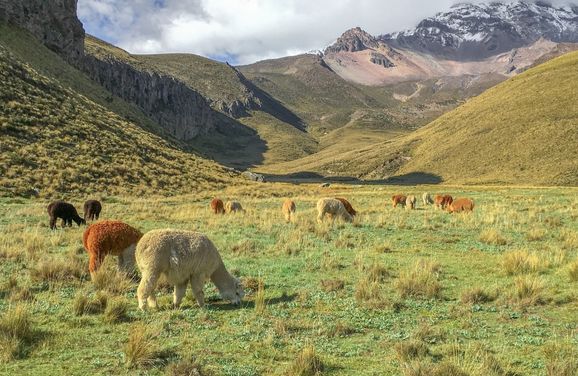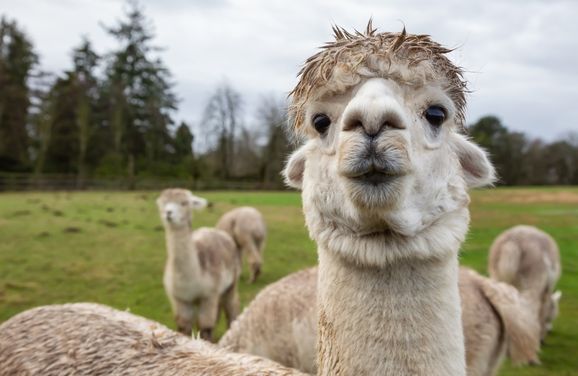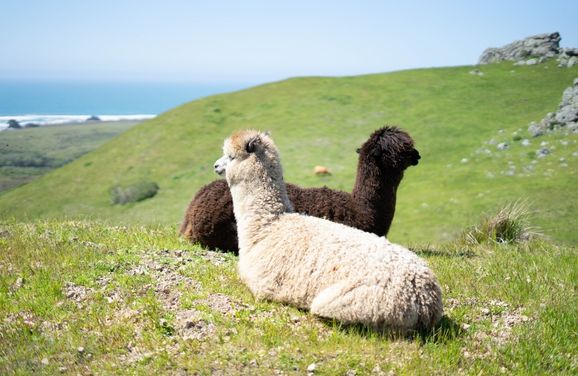Are you thinking about adopting an alpaca? Do you already have an alpaca, or are you generally inquiring about this adorable animal and asking yourself, “Can alpacas live alone“?
Well, your question is valid, and I salute you for your care toward your fuzzy friend!
Alpacas can live alone; however, they are considered social animals because they form strong bonds with their herd mates. So, suppose your alpaca must live alone. In that case, regular interaction with humans or other pets is essential to avoid the stress caused by solitude.
In this article, we will explore the possible consequences of solitary living on alpacas.
So, in today’s guide, we will clearly understand their social needs and cover everything you need to know about solo alpaca living.
What is the social nature of alpacas, and why do they prefer to live in herds?
Alpacas are considered social animals.
These fluffy animals are originally from South America and belong to the camelid family.
The evolutionary history of alpacas demonstrates the reason why these animals prefer to live among their family group.

In the wild, alpacas always live in herds because they feel more secure and safe from potential predator attacks.
So, we can say that living in herds is a natural way that these animals are conditioned to follow so they can maintain healthy and normal living conditions.
Plus, inside the alpacas living circle that is often called bands, not only do they feel protected in the presence of each other, but they also form a strong social connection.
This enduring bond is illustrated by the development of ways of communication through sounds and body language gestures.
So, we can now have a clear picture that our fuzzy pals require to live in groups to live in peaceful and calm living conditions.
What are the possible health and behavioral issues that can be induced due to keeping an alpaca alone?
As I stated before, while alpacas can live alone, they remain social animals that need company.
So, solitude and lack of interaction have the potential to cause a negative impact on their behavior patterns that can escalate to health difficulties.
An alone alpaca can be trapped in boredom.
The scarcity of interaction causes monotony and poor stimulation, which can cause behavior changes such as increased chewing and pacing.
Another side effect that can be caused by keeping alpacas alone is stress.
The alpaca falls into a stressful and draining circle due to the absence of its own groups or other friendly animals.
You can detect this stress by observing the behavior of your alpaca.
If you notice that your fluffy pal is not eating as much as usual, is not active, and quickly gets sick, these are the alarming stress of an alpaca that is not doing well.
Plus, in some cases, the behavior shifts can escalate to aggression.
Solitude can potentially make alpacas behave aggressively if other animals or humans approach them.
As a result, these three undesirable behaviors (boredom, stress, and aggression) changes can eventually lead to health difficulties.
These potential health problems vary between wool-related issues, poor teeth health, and foot articulation problems.
Having one alpaca? Here are some essential tips to ensure the well-being of your animal
If you have only one alpaca, then there are some steps that you can follow to create a healthy and calm lifestyle for your fuzzy pal.

1. Provide fun ways to stimulate your alpaca
Toys like puzzle feeders, treats, and objects to play with your adorable alpaca are an exciting way to keep it stimulated and prevent it from feeling bored.
2. Keep your alpaca active
Solitude can cause a lack of activity.
To prevent that, ensure your alpaca has access to a spacious area so it can move comfortably, play, and discover its environment.
3. Regular interaction is crucial
Alpacas are social animals, so they must interact with others.
Make sure to spend quality daily time with your pet by playing with it, feeding it, or grooming it.
This will play a significant role in making your alpaca way less alone and at ease.
4. Monitor the diet of your animal
Nutrition is crucial to helping your fuzzy friend maintain a healthy lifestyle.
Make sure that your alpaca receives its daily nutritional requirements in terms of vitamins, minerals, fiber, and protein.
5. Consult a veterinarian regularly
Frequent vet check-ups are a must to monitor the health of your alpaca, especially alpacas that live alone.
Professional supervision helps detects any early negative consequences that are due to solitude.
6. Consider other animals
Adding another animal to accompany your alpaca is such an excellent idea if it is, of course, doable for you.
Alpaca gets along with many animals, such as goats or sheep.
So, a goat or a sheep can live harmoniously with alpaca, making daily life more fun.
Following these vital tips ensures this adorable animal lives a healthy and peaceful life, even if it’s not in a herd.
Can Alpacas leave in pairs?
Alpacas can live in pairs; they actually do very well when kept in pairs or small herds because they are social animals that love being surrounded by their own kind.

Keeping alpacas in pair play a vital role in boosting their well-being rather than living alone.
These animals thrive and feel more secure and calm when surrounded by other alpacas.
Yet, it’s essential to gradually present new alpacas to each other and observe their interactions to ensure they develop a harmonious relationship that is beneficial for both parties.
Conclusion
Alpacas can live solitary lives, yet they are not totally used to being alone as they are considered social animals requiring stimulation and interaction. Keeping alpaca alone without proper supervision can lead to behavior changes such as stress, aggression, and health issues.
If you can’t keep your alpaca in a herd, ensure its diet is healthy and well-balanced; spend more time with it by playing with your fluffy pal, grooming it, and by providing an open space where it can move around.
Yet, it is best not to leave your alpaca alone and instead provide them with the companionship of at least another alpaca or another animal like a goat.
Leave a Reply